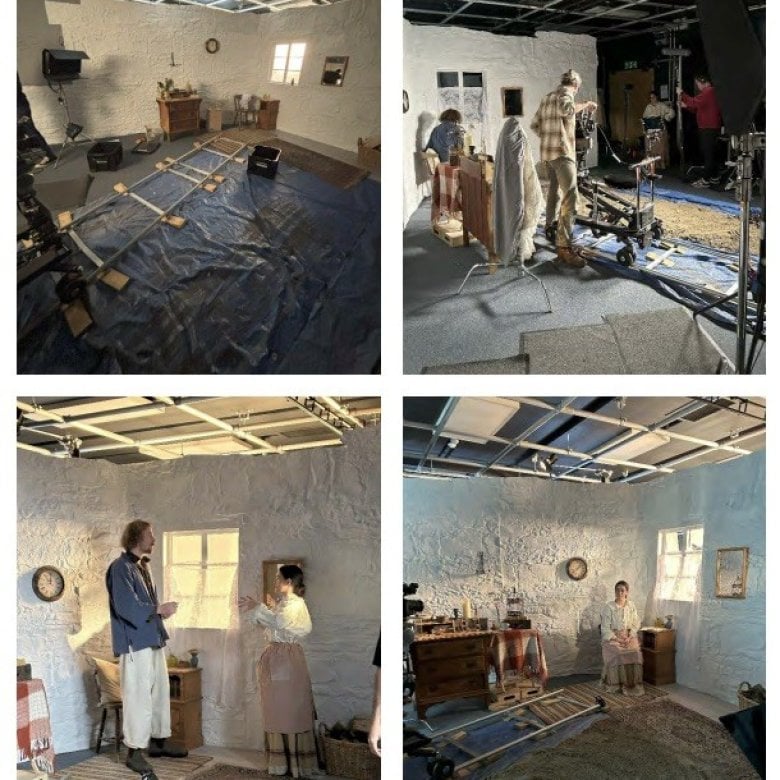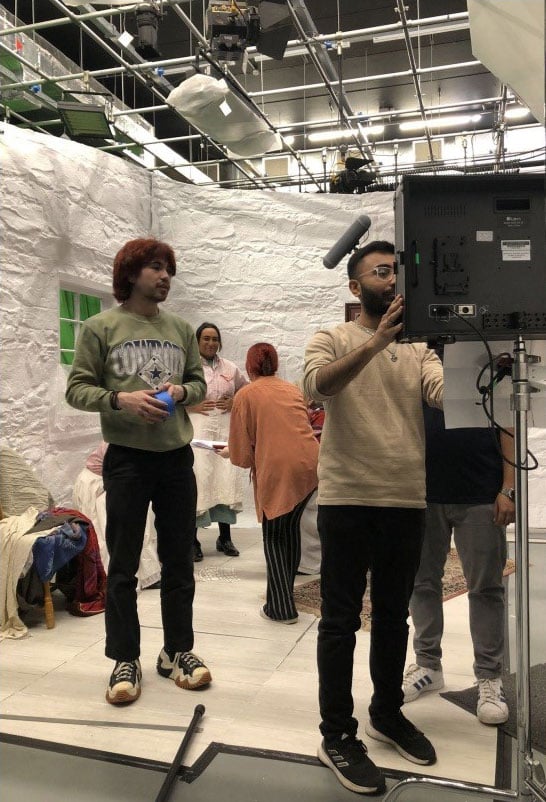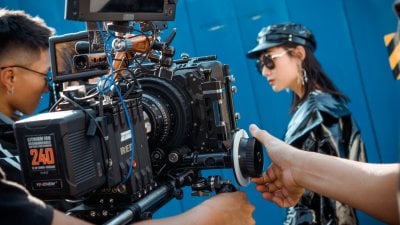Film & TV master’s students on their placement at Verve Media
09 August 2024


Four students on the Film & Television MA course completed a week’s placement at Verve Media earlier this year.
Students Mohammed Ali (known as Ali), Baeshaz Pastakia, Rounak Chandak, and Althea Strode were able to set up, test, and maintain industry-leading technology in a commercial environment. They also got to work with industry professionals on a variety of big-name productions.
Verve Media provides equipment and experienced personnel for a wide variety of shoot types, up to and including high-end cinematic projects. We caught up with Baeshaz, Ali and Rounak and asked them about their time on the placement.
How did the placement come about?
Baeshaz: Our course leader, Nick Manley, was kind enough to provide us with the opportunity for work experience at Verve Media in May. It was a week-long placement at the Verve Media studios located in South London.
What were you doing during the placement?
Baeshaz: On my first day, I was introduced to all the team members working at the studio and aimed to familiarise myself with the equipment right away. Throughout the week, I was assigned various tasks, including testing cables with cameras and handling other technical responsibilities. One of my key assignments was to understand the technical aspects of the camera and the entire process of cleaning and maintaining it before it goes out for a job. I had the opportunity to build and work with some high-end cameras like the Alexa Mini and the Sony FS9.
Ali: I was working with Verve on-site as an Assistant Director of Photography (DOP), as well as a still photographer on one of their shoots for America's Worst Cook.
Rounak: My role was to help check the equipment after it came back from a shoot and put it back in the right places.
What was the most important thing you learnt?
Baeshaz: I learnt about the technical intricacies of the camera equipment. Understanding how to clean and maintain cameras properly was crucial, and it was good to understand this in an industry setting. This hands-on experience was invaluable in deepening my knowledge of camera operations and maintenance.
Ali: I learnt how big productions work in London and how structured they are compared to any other shoot I’ve been on.
Rounak: The most important thing I learnt at Verve was how the equipment is organised. I've been on sets before, but I never knew what goes behind setting all that heavy equipment up before a shoot.

What was the best bit of kit you got to use?
Baeshaz: The best bit of kit I got to work with was the Alexa Mini camera. Its advanced features and capabilities made it a standout piece of equipment, and getting hands-on experience with it was incredibly exciting.
Ali: On one of the days, I set up an Arri Alexa Mini with a teleprompter and tested it by reading old news bulletins from the BBC. On another, I met the DOP for MasterChef UK and worked with him setting up some lighting.
Rounak: I got to see a lot of fancy equipment that is used in the industry. One such kit was the ARRI Alexa Mini cameras, something I had never used before. I was asked to help build two of them on my first day for James Clarke, the cinematographer for The Apprentice UK. I also got a chance to assist him the next day for an interview shoot, which was the highlight of my internship.
Did it make you understand anything in the industry differently?
Baeshaz: This work experience made me realise the vastness of the industry and the significant amount of effort that goes into even a small shoot. It was eye-opening to see the behind-the-scenes work that is necessary to bring a project to life.
Ali: I gained a lot of exposure to the London film industry. London has more film production than the rest of the UK, so there are a lot of good contacts to make and chances to network.
Rounak: Verve was probably 3-4 times the size of the stores we have at the university. Just the scale with which they operate was quite overwhelming to see. Additionally, I realised how relaxed and unorganised student film productions are sometimes. Although the shoot I went on was a small one but still there was a lot to learn from professionals about how they plan and implement on site. I must also thank James Clarke and his AC Joe Ferrari for how supportive they were to help me understand everything they did, from the choice of lenses to the placement of lights. All this industry insight both on and off set in just one week helped me a lot in my future productions on the course.
Would you recommend placements to other Film and TV students?
Baeshaz: I would definitely recommend Film and TV students try and get a placement at Verve. It’s an excellent way to broaden your horizons and open up more opportunities for the future. Gaining practical experience and understanding the industry from an inside perspective is invaluable for anyone looking to pursue a career behind the camera.
Ali: 100%, it was an amazing opportunity.
Rounak: I would definitely recommend placements like this to other Film & TV students. I would also like to thank Nick Manley and Will Wilkinson (Director of Verve) for providing me with this opportunity.





